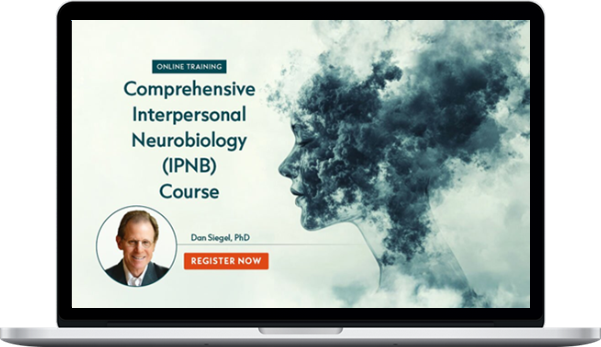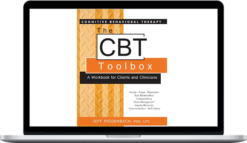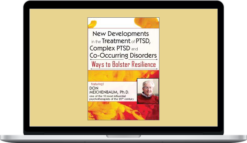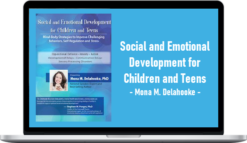Daniel Siegel – The Mindsight Approach to Well-Being: A Comprehensive Course in Interpersonal Neurobiology
$99.00 $50.00
Total Sold: 1
»Instant Delivery
Description
Daniel Siegel – The Mindsight Approach to Well-Being: A Comprehensive Course in Interpersonal Neurobiology
What is Interpersonal Neurobiology (IPNB)?
Interpersonal neurobiology (IPNB) is an interdisciplinary framework that seeks to understand the complex interplay among human relationships, the mind, and the brain. It integrates findings from various fields such as neuroscience, psychology, and attachment to explain how personal experiences and interpersonal relationships shape the development and functioning of the brain, which in turn influence emotional, social, and cognitive processes. IPNB emphasizes that our relationships and social connections have a profound impact on our mental health and neural functioning.
Why Study Interpersonal Neurobiology (IPNB)?
Studying Interpersonal Neurobiology (IPNB) can be profoundly beneficial for several reasons:
- Comprehensive Framework for Understanding Human Behavior: IPNB offers a comprehensive framework connecting psychological, neural, and relational aspects, enabling a deeper grasp of how these factors shape behavior and development.
- More Empathy and Compassion: IPNB helps individuals understand the neurological basis of human connections, fostering greater empathy and compassion, especially beneficial for professionals in therapeutic, educational, and caregiving roles.
- Enhanced Relationships: An understanding of IPNB enhances interpersonal relationships by providing insights into effective communication, conflict resolution, and emotional sharing.
- Professional Development: IPNB benefits practitioners in psychology, psychiatry, education, and social work with evidence-based approaches to therapy, teaching, and community work.
- Personal Growth: IPNB fosters self-awareness by revealing how one’s brain influences relationships, leading to personal growth and improved self-regulation.
- Innovation in Treatment: IPNB drives innovation in mental health treatment with holistic and personalized approaches based on the brain-mind-relationship connection.
- Social Change: IPNB informs policies and practices to create supportive relational environments, particularly in educational systems and organizations, promoting social change.
Course Syllabus – Highlights
- Segment 1: Mind, Brain and Relationships in the Cultivation of Well-Being
- Segment 2: Attachment and How Close Relationships Shape Who We Are
- Segment 3: The 1st Domain of Integration: Consciousness and Dr. Siegel’s Reflective Practice, “The Wheel of Awareness”
- Segment 4: The 2nd, 3rd, and 4th Domains of Integration: Linking the Two Sides of the Brain, the Embodied Brain and Memory
- Segment 5: The 5th and 6th Domains of Integration: Making Sense of Life through Our Narratives and States of Mind
- Segment 6: The 7th, 8th and 9th Domains of Integration: Interpersonal Relationships, Dimensions of Time, and Facets of Identity
About Dr. Dan Siegel
Dr. Dan Siegel, a smiling older man in a suit with glasses, red hair, and holding his dog
Dan Siegel is the founder and director of education of the Mindsight Institute and founding co-director of the Mindful Awareness Research Center at UCLA, where he was also co-principal investigator of the Center for Culture, Brain, and Development and clinical professor at the School of Medicine.
An award-winning educator, Dan is the author of five New York Times bestsellers and other books which have been translated into over forty languages. He is the founding editor of the Norton Professional Series on Interpersonal Neurobiology, and has overseen the publication of over one hundred textbooks in this transdisciplinary framework focusing on the mind and mental health.
A graduate of Harvard Medical School, Dan completed his postgraduate training at UCLA specializing in pediatrics and adult, adolescent, and child psychiatry. He was trained in attachment research and narrative analysis through a National Institute of Mental Health research training fellowship focusing on how relationships shape our autobiographical ways of making sense of our lives and influence our development across the lifespan.
More courses from the same author: Dan Siegel
Delivery Policy
When will I receive my course?
You will receive a link to download your course immediately or within 1 to 21 days. It depends on the product you buy, so please read the short description of the product carefully before making a purchase.
How is my course delivered?
We share courses through Google Drive, so once your order is complete, you'll receive an invitation to view the course in your email.
To avoid any delay in delivery, please provide a Google mail and enter your email address correctly in the Checkout Page.
In case you submit a wrong email address, please contact us to resend the course to the correct email.
How do I check status of my order?
Please log in to HealthcareCourse account then go to Order Page. You will find all your orders includes number, date, status and total price.
If the status is Processing: Your course is being uploaded. Please be patient and wait for us to complete your order. If your order has multiple courses and one of them has not been updated with the download link, the status of the order is also Processing.
If the status is Completed: Your course is ready for immediate download. Click "VIEW" to view details and download the course.
Where can I find my course?
Once your order is complete, a link to download the course will automatically be sent to your email.
You can also get the download link by logging into your HealthcareCourse account then going to Downloads Page.
Related products
Total sold: 4
Total sold: 1
Total sold: 4









